|
|
|
Sort Order |
|
|
|
Items / Page
|
|
|
|
|
|
|
| Srl | Item |
| 1 |
ID:
133161
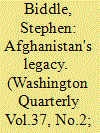

|
|
|
|
|
| Publication |
2014.
|
| Summary/Abstract |
The war in Afghanistan is not over. Nor is it ending any time soon. The U.S. role may end in 2016, in whole or in part, but the war will continue-and its ultimate outcome is very much in doubt. The conflict is now stalemated militarily, and will likely stay that way as long as outsiders pay the large bills needed to keep the Afghan National Security Forces (ANSF) in the field and fighting. The war will thus grind onward until this funding dries up or the two sides negotiate a compromise settlement, neither of which is imminent. Depending on how any talks unfold, historians in 2050 could thus look back on this war as a costly but tolerable outcome for the West, as a wasteful disaster, or as something in between; for now, all we know for sure is that it continues.
|
|
|
|
|
|
|
|
|
|
|
|
|
|
|
|
| 2 |
ID:
185282
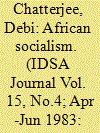

|
|
|
| 3 |
ID:
106872
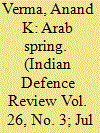

|
|
|
| 4 |
ID:
130606
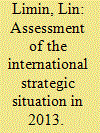

|
|
|
|
|
| Publication |
2014.
|
| Summary/Abstract |
The international strategic situation in 2013 appeared very calm than ever before and had no outstanding features; the fact of its having no special feature was its de?ning characteristic. Although 2013 could be
characterized as a normal year, the international strategic situation has undergone some profound changes. One of the most important is that the United States may have quietly given up its role of the "world police." The 'post-American era' has begun to arrive without attracting much attention in the international community. Many of these profound changes, including the long-term downturn of the world economy, the ongoing process of the West 's decline and the rise of the East, the endless chaos in the Middle East, readjustments in the international order and great power relations, and the evolving relationship between China and the U.S. are all closely related with this dawning of the 'post-American era.' Thus, the 2013
international strategic situation could be seen as holding the seeds of greater change than has been seen since the collapse of the Soviet Union in 1991.
|
|
|
|
|
|
|
|
|
|
|
|
|
|
|
|
| 5 |
ID:
042132
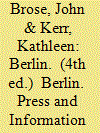

|
|
Berlin
/ Brose, John; Kerr, Kathleen
|
1969

|
|
|
|
| Edition |
4th ed.
|
| Publication |
Berlin, Press and Information Office, 1969.
|
| Description |
112p.Pbk
|
|
|
|
|
|
|
|
|
|
|
|
Copies: C:1/I:0,R:0,Q:0
Circulation
| Accession# | | | | | | | | | | | |
| 009462 | 943.155/BRO 009462 | Main | On Shelf | General | | | | | | | |
|
|
|
|
| 6 |
ID:
130610
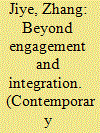

|
|
|
|
|
| Publication |
2014.
|
| Summary/Abstract |
As part of its new strategy of "retuming to the Asia-Pacific region", the A Obama administration has adopted some tough economic policies towards China, notably promoting the Trans-Paci?c Partnership (TPP) and attempting to establish new rules of international trade and investment aimed at strengthening economic ties with other Western countries through the Trans-Atlantic Trade and Investment Partnership Agreement(TTlP ), both of which tend to compress the geopolitical space for China's economic rise. The administration is also using a 'green barrier' to suppress the development of China's high-tech industry, and using economic diplomacy and investment restrictions against Chinese state-owned enterprises. This paper seeks to examine and analyze the causes of shifts in the U .S. economic strategy towards China.
|
|
|
|
|
|
|
|
|
|
|
|
|
|
|
|
| 7 |
ID:
184640
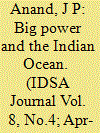

|
|
|
| 8 |
ID:
132418
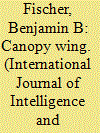

|
|
|
|
|
| Publication |
2014.
|
| Summary/Abstract |
Although Winston Churchill declared that history is always written by the victors, never the vanquished, a group of former East German foreign intelligence officers seem determined to prove him wrong. Calling themselves Insiders have been churning out books since the end of the Cold War that recount the history of that conflict from their perspective. The Insiders' mantra is that they were on the right, even if losing, side because they "spied for peace" to protect the Warsaw Pact against the existential threat posed by the "aggressive intentions" of the West.
|
|
|
|
|
|
|
|
|
|
|
|
|
|
|
|
| 9 |
ID:
089367
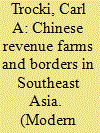

|
|
|
|
|
| Publication |
2009.
|
| Summary/Abstract |
This article examines the role of Chinese revenue farmers in defining the borders of the various colonial territories and the states of Southeast Asia during the nineteenth century. Their significance has largely been neglected in writing on the formation of state boundaries. Nicholas Tarling notes, 'Between the late eighteenth and the early twentieth almost all southeast Asia was divided into colonies or protectorates held by the Western powers, and new boundaries were drawn with the object of avoiding conflict among them' (Tarling, 2001:44). This paper argues that Chinese revenue farmers were of considerable significance in giving substance to the formalistic pronouncements of remote diplomats and statesmen.
|
|
|
|
|
|
|
|
|
|
|
|
|
|
|
|
| 10 |
ID:
132536
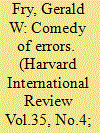

|
|
|
|
|
| Publication |
2014.
|
| Summary/Abstract |
Political crises are nothing new for Thailand. Since becoming a constitutional monarchy in 1932, the country has faced numerous political crises, including a 1973 student revolution to overthrow a military dictatorship, the storming of Thammasat University and the installation of an extremely right-wing government in 1976, and the people power victory over General Suchinda in 1992. In September 2006, a military coup deposed the former prime minister, Dr. Thaksin Shinawatra. In retaliation against the coup, Thaksin supporters in 2006 formed the United Front for Democracy against Dictatorship (UDD), a political pressure group whose supporters are commonly called Red Shirts.
|
|
|
|
|
|
|
|
|
|
|
|
|
|
|
|
| 11 |
ID:
150807
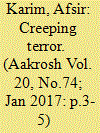

|
|
|
|
|
| Summary/Abstract |
The Islamic State of Iraq and the Levant (ISIL) may be forced to retreat
from Iraq-Syria under relentless pressure from forces allied with
Western powers, but the retreat is going to be painfully slow and
despite retreat, ISIL will be far from being finally defeated. If ousted
from west Asia, ISIL is likely to relocate in Africa and the Af-Pak and
launch new offensives. It is already gradually moving to the south
Asian region, which has the largest congregation of Sunni Muslims,
who support the ISIL ideology. South Asia will also provide ISIL greater
safety from Western forces and open opportunities to spread its
tentacles in various countries of the south and central Asian region. If
it eventually moves to south Asia in force, India will face a new,
dangerous challenge from Islamic forces.
|
|
|
|
|
|
|
|
|
|
|
|
|
|
|
|
| 12 |
ID:
131639
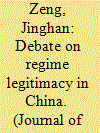

|
|
|
|
|
| Publication |
2014.
|
| Summary/Abstract |
This article identifies continuities, new trends and shifts in emphasis in the Chinese elite debate about political legitimacy by analysing 125 Chinese articles concerning legitimacy published between 2008 and 2012. It reveals a remarkable cleavage between the international perceptions of the Chinese state and the pessimistic views among Chinese intellectuals about the party's ruling. It finds that Chinese scholars often look at Western theories when dealing with the legitimacy conundrum, and rarely look at Chinese philosophy. They focus on ideology much more than Western scholars, and they are more pessimistic about performance legitimacy than the latter. Moreover, this study finds that the legitimacy concerns and policy suggestions of scholars vary significantly depending upon their research locations, institutions and funding sources. This study also finds a distinct rising appeal of social autonomy that runs counter to the dominant official line. Nowadays, value changes, socioeconomic inequality and corruption are considered to be the most perceived threats to legitimacy; ideology, social justice and governance are the leading prescriptions for the party-state. This result is vastly different from the previous study, suggesting a fundamental shift in the legitimacy debate driven by the worsening socioeconomic problems in China.
|
|
|
|
|
|
|
|
|
|
|
|
|
|
|
|
| 13 |
ID:
128859
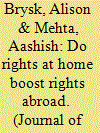

|
|
|
|
|
| Publication |
2014.
|
| Summary/Abstract |
Does women's empowerment strengthen global good citizenship? We test theories of democratic foreign policy and feminist international relations that suggest that more deeply democratic countries with greater gender equity will be stronger international human rights promoters. First, the direct empowerment of women as policymakers and civil society constituencies may shift states' incentives and ability to pursue international human rights initiatives. Second, greater sexual equality may lead to feminist socialization of the wider society to promote human rights values. We test these predictions by measuring the relationship between five different measures of sexual equality and a country's propensity to support 30 international human rights outcomes, including legal commitments, humanitarian assistance, and sanctions, controlling for previously established contributing factors such as level of development and democratic regime type. We find that more sexually equal countries are more likely to support international commitments to constrain state violence against individuals, international measures to combat gender and sexual orientation discrimination, and more and higher quality development assistance. However, sexual equality appears to yield less benefit for more costly human rights initiatives: yielding sovereignty to international legal institutions, promoting economic rights through concessionary trade policies, or adopting diplomatic sanctions against pariah states. These effects are stronger in democratic states, where citizen empowerment translates more readily into foreign policy, and are also found in a sample that excludes the Western powers.
|
|
|
|
|
|
|
|
|
|
|
|
|
|
|
|
| 14 |
ID:
132698
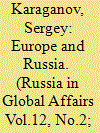

|
|
|
|
|
| Publication |
2014.
|
| Summary/Abstract |
Debates over the ongoing crisis in relations between Russia and the West revolve around the incorporation of Crimea, the global reaction to that move, and the future configuration of the Ukrainian state if, of course, it manages to survive (and I hope it will). But I contend that these are not the primary issues in global terms. There are other crucial questions. The first is what the European security system will be like. I repeat: the Old World was not allowed to withdraw from the Cold War, and now it may see a new round of tension. The second important question is whether Russia will be able to overcome the impasse in its development, in which it found itself after it restored statehood at the end of the 2000s. The third and closely linked question is whether Russia will wish to remain part - even an independent and very special partner - of Europe or will it opt for cultural-civilizational isolation and increasingly lean towards the East economically. It is obvious that Russia is firmly determined to change the rules of the game that have been dictated to it for the past twenty-five years. Unable and reluctant to toe the line, Russia has given up attempts to become part of the West.
|
|
|
|
|
|
|
|
|
|
|
|
|
|
|
|
| 15 |
ID:
129528
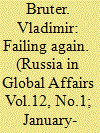

|
|
|
|
|
| Publication |
2014.
|
| Summary/Abstract |
"All of old. Nothing else ever. Ever tried. Ever failed no matter. Try again. Fail again. Fail better."
Worstward Ho, Samuel Beckett
The allusion to the quotation from Samuel Beckett, a classic Theatre of the Absurd playwright, in the article headline is not accidental. Most Western analysts describe the current situation in Ukraine as "fail" or "epic fail" and thus show much more skepticism and caution about the developments there than politicians in their own countries
|
|
|
|
|
|
|
|
|
|
|
|
|
|
|
|
| 16 |
ID:
131632
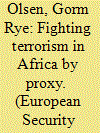

|
|
|
|
|
| Publication |
2014.
|
| Summary/Abstract |
The French intervention in Mali in early 2013 emphasizes that the decision-makers in Paris, Brussels, and Washington considered the establishment of the radical Islamist regime in Northern Mali a threat to their security interests. The widespread instability including the rise of radical Islamist groups in Somalia was perceived as a threat to western interests. It is the core argument of the paper if western powers decide to provide security in Africa, they will be inclined to use proxy instead of deploying own troops. Security provision by proxy in African means that African troops are doing the actual fighting and peacekeeping on the ground while western powers basically pay the costs, the logistics, and the training of local African troops. The paper concludes that the African Union Mission in Somalia (AMISOM) in Somalia and The African-led International Support Mission to Mali (AFISMA) in Mali are proxies for the USA and the European Union.
|
|
|
|
|
|
|
|
|
|
|
|
|
|
|
|
| 17 |
ID:
133263
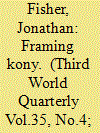

|
|
|
|
|
| Publication |
2014.
|
| Summary/Abstract |
This article explores the influence of actors and organisations outside the corridors of power in Washington, DC on US 'crisis foreign policy making' in Africa. Focusing on the case of US policy towards the lra/northern Uganda crisis - particularly the Obama administration's 2011 decision to send 'combat-equipped US forces' to pursue the rebel group across central Africa - it is argued that the role of African governments themselves merits greater consideration. The decision to send in these 'military advisers' was arguably strongly influenced by campaigns run by Western policy institutes, notably the International Crisis Group, and US advocacy groups since around 2007. The Ugandan regime of Yoweri Museveni has - it is suggested - nevertheless itself fundamentally shaped the nature and direction of the debate into which such groups have entered. This raises crucial questions about the agency of African governments in Western 'crisis' decision-making fora.
|
|
|
|
|
|
|
|
|
|
|
|
|
|
|
|
| 18 |
ID:
138184
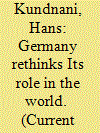

|
|
|
|
|
| Summary/Abstract |
In January 2014, German President Joachim Gauck gave a remarkable speech at the Munich Security Conference in which he exhorted his compatriots to take greater responsibility for solving global problems. He criticized those who “use Germany’s guilt for its past as a shield for laziness or a desire to disengage from the world.” Most controversially in a country that aspires to be a Friedensmacht, or a “force for peace,” he said Germany should “not say ‘no’ on principle” to the use of military force. Polls carried out after the speech suggested that the German public was skeptical—particularly about the use of military force. Although several other leading politicians such as Foreign Minister Frank-Walter Steinmeier and Defense Minister Ursula von der Leyen expressed support for Gauck, Chancellor Angela Merkel remained conspicuously silent.
|
|
|
|
|
|
|
|
|
|
|
|
|
|
|
|
| 19 |
ID:
118666
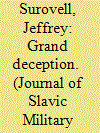

|
|
|
|
|
| Publication |
2012.
|
| Summary/Abstract |
It has long been widely assumed that Russia has been an ally of the Serbs and that it was in particular an anti-Western supporter of Belgrade during the wars of the 1990s. In fact, Russia, in cahoots with the Western powers and NATO, played a game of deception to make it appear that it was 'anti-Serbian' when in reality it acted as 'errand boy' in order to fulfill the West's objectives in the former Yugoslavia.
|
|
|
|
|
|
|
|
|
|
|
|
|
|
|
|
| 20 |
ID:
128860
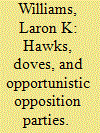

|
|
|
|
|
| Publication |
2014.
|
| Summary/Abstract |
Parliamentary regimes offer the unique opportunity for opposition parties to react to foreign policy by proposing no-confidence motions (NCMs). The threat of an NCM bringing down the government may be enough to induce pacific behavior by the executive. Yet, this simplistic characterization neglects the possible electoral motivations of opportunistic opposition parties. I develop a theory that opposition parties respond to involvement in international conflict by proposing NCMs as a tool to influence voters' opinions with an eye toward the next election. I develop two expectations based on policy disagreement and issue ownership that I use to explain the electorally motivated decision to propose NCMs following conflict. I test these expectations with a dataset of 14 European parliamentary democracies from 1970 to 2001. The empirical evidence suggests that the partisanship of both the government and opposition parties interact to create varying electoral incentives to propose NCMs based on issue ownership. Right-wing opposition parties are more likely to challenge than left-wing parties, and this effect is exacerbated when facing left-wing governments. This study has important implications that underpin a number of theories of the domestic causes of international conflict as well as implications for the study of party strategy.
|
|
|
|
|
|
|
|
|
|
|
|
|
|
|
|
|
|
|
|
|